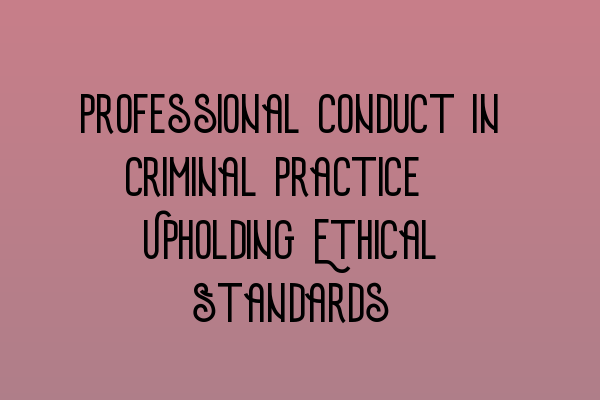Professional Conduct in Criminal Practice: Upholding Ethical Standards
As criminal law practitioners, it is paramount that we uphold the highest ethical standards in our profession. Not only does this ensure the integrity of the legal system, but it also safeguards the rights and interests of our clients. In this blog post, we will explore the importance of professional conduct in criminal practice and discuss some key ethical considerations that all lawyers should keep in mind.
The Duty to Act in the Client’s Best Interest
One of the fundamental principles of professional conduct is the duty to act in the best interest of our clients. This means providing them with competent and diligent representation, ensuring that their legal rights are protected at all times. As criminal law practitioners, we must strive to achieve the best possible outcome for our clients within the bounds of the law.
However, it is crucial to remember that acting in the client’s best interest does not equate to compromising our ethical obligations. We must always adhere to the rules and regulations set forth by the Solicitors Regulation Authority (SRA) to avoid any conflicts of interest or breaches of professional conduct.
Confidentiality and Privilege
Confidentiality is a cornerstone of the lawyer-client relationship. Our clients trust us with their most sensitive information, and it is our duty to maintain the strictest confidentiality. This includes not disclosing any privileged communications without the client’s informed consent, except in limited circumstances permitted by law.
To protect client confidentiality, it is essential to implement appropriate measures, such as secure file storage and encryption, to safeguard sensitive information. Failing to uphold confidentiality not only violates professional conduct rules but also erodes client trust, which is detrimental to our reputation and professional relationships.
The Duty of Candor
Honesty and candor are integral to maintaining professional conduct in criminal practice. As criminal law practitioners, we have a duty to provide truthful and accurate information to the court, opposing counsel, and clients. This includes disclosing any potential conflicts of interest, managing client expectations, and presenting evidence in a fair and impartial manner.
In instances where our obligations to the court and the client may conflict, we must navigate these ethical dilemmas carefully. Consulting with colleagues and seeking guidance from regulatory bodies such as the SRA can help in making informed decisions that uphold professional conduct standards.
Continuing Professional Development
Staying updated with changes in the law and enhancing our skills and knowledge is crucial for maintaining professional conduct. Continuous professional development enables us to provide the best possible representation to our clients and ensures that we are aware of any changes in legal procedures, sentencing guidelines, and case law.
Participating in SQE 1 and SQE 2 preparation courses, such as those offered at SQE Criminal Law & Practice Law UK, can be instrumental in enhancing our understanding of legal principles and improving our ability to uphold professional standards. These courses cover a wide range of topics and provide valuable resources to lawyers seeking to excel in their criminal practice.
To stay up-to-date with upcoming SRA SQE exam dates, visit SRA SQE Exam Dates. These dates are essential for planning your study and exam preparation effectively.
Conclusion
Upholding ethical standards is not only a legal requirement but also a moral obligation for criminal law practitioners. By acting in the best interest of our clients, maintaining confidentiality and privilege, practicing honesty and candor, and continuously advancing our professional development, we ensure the integrity of our profession and uphold the trust bestowed upon us by our clients. Let us always strive to maintain the highest standards of professional conduct in criminal practice.
For further SQE preparation resources, check out the following articles:
- SQE 1 Practice Exam Questions
- SQE 1 Practice Mocks FLK1 FLK2
- SQE 2 Preparation Courses
- SQE 1 Preparation Courses
- SRA SQE Exam Dates
